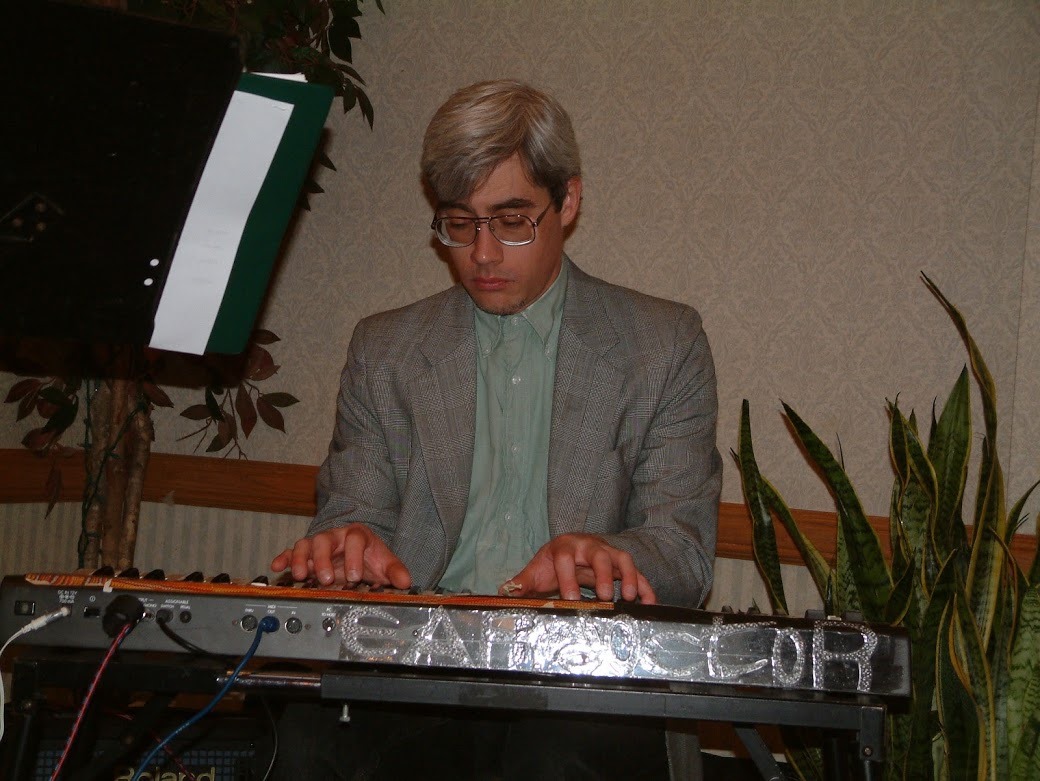 |
| Press |
Artist: Eureka Brown
Album: Future Vision of the Digital Univers
Album: Future Vision of the Digital Univers
Year: 2007
Label: Digitalia Records - DR01
Format: Mp3 (Zip Folder)
Track-list:
- Sketch
- Oh Me Oh My
- Make It Stop
- Dear Heavens
- Hurricane Eureka
- The Future Is Now
- Beneath Moonlight
- Don't Look Back
- Queen Future
- Tropical Paradise
Polehouse: Recorded at, Mixed at
Mass Music: Recorded at (Flute)
Personnel:
Eureka Brown: Vocals, Guitars, Keyboards, Bass, Drums, Produced by, Written by, Recorded by, Photography, Layout
Kris Bauer: Artwork (Puzzle)
Tom Paynter: Flute (5)
Todd Reising: Recorded by (Flute)
© 2007 Eureka Brown. All rights reserved. Written, Performed & Recorded by Eureka Brown at Polehouse. Flute performed by Tom Paynter and recorded by Todd Reising at Mass Music.
Notes:
This download-only debut was freely released via MySpace (incognito) in two installments: tracks 1-5 on 6/23/07, and tracks 6-10 on 10/31/07 (Halloween). Each mp3 contained a puzzle piece that combined to form the stream-of-thought drawing that was the basis of the "Sketch" music video. The late, great Tom Paynter contributed an impromptu flute performance to the album's center piece "Hurricane Eureka."
EB: While I've always had cold feet when it comes to the concept of trans-humanism, I've also been mischaracterized as an "anti-luddite duo." So where do I really stand, if not at either of the polar opposites?—for one thing, I stand alone! I'm not a pair of people, but one...
But my "future vision of the digital universe," in a nutshell, was basically this; imagine Grooveshark, before it was overpowered by YouTube, but with more advanced search functionality, than even Google Books. A free music streaming service, with user submitted content, without audible advertisements, where you can manage your own playlists. But the search filters allow you to hone in on the content with the precision of a laser beam.
For example, if you wanted to hear only music from the 1970s on Trojan Records, you could choose the decade, the label, the artist; you narrow it down as much as you want. You can also specify things to exclude, to customize your search results; explicit content, a certain artist, whatever you want. You can search for songs that exclude or include certain keywords, or phrases that fit your thematic needs. Like, one time we had a benefit for a guy whose apartment burned down, and all of the music we played had lyrics that were about "fire."
When you click on an artist name, you don't only get their whole discography, but a wiki article like option from a side panel, where you can import related lists of associated acts to generate results that you can listen to. Like, if you were reading about how Gilberto Gil was involved with the Tropicália musical movement, you could click on "seminal albums" and immediately add them to your queue. It takes all the things you need to explore and combines them all into one.
But alas! The big fish came along and gobbled up the small fish, and the closest the thing we ever had was snuffed out, being too disruptive, apparently, to the music industry's shifting landscape at the time.
Who knows? Maybe someday in the future, when audio technology advances far beyond its current stereo limitations, the discography of humankind, up until that point, will be sufficiently organized to make the dream come true, freely accessible for anyone who's still interested in such a primitive form of expression—cause music's totally going full spectrum, if it ever gets the chance; a fully immersive AR type of audio experience that makes left and right channels look like child's play.
On the other hand, if we ask for a fish and get a serpent, and the future of the "internet" is more of a dystopian nightmare, worst case scenario, I'll take my chances rubbing sticks in the boonies with acoustic instruments. After all, nothing's more realistic than the real thing.
But in the beginning the idea was just to embrace the potential of technology, to enable us to reach a much larger audience than ever before. Instead of asking blogs to take down links to downloads of our music, we supplied them with them ourselves, expanding as rapidly as possible. MySpace was the Excalibur of social media in that regard, before Facebook rewrote the etiquette rules and cancelled the parade.
When the first installment of Future Vision dropped, over the summer of 2007, our friends thought we were insane for giving our music away for free. But then Radiohead released In Rainbows, in the fall, on October 10, without any prior warning, which sort of validated our approach. Although Future Vision officially dropped on Halloween of 2007, the first installment was a free download before there was any such thing as In Rainbows—it wasn't even "name your price," and ours were 192s, not 160s:P
Tom Paynter used to hang out at Mass Music all the time—the recording studio in the back of Parasol we used for a practice space. It used to be the headquarters of producer Adam Schmitt, but Todd Reising ran the show by the time we all crossed paths over there. He would sometimes record jazz groups at Zorba's and the Iron Post, and lots of the music faculty people came around the studio then. But Tom was more of a regular who'd ramble on into the morning hours with us.

I remembered him mostly from his Ear Doctor days on the keys. We used to go play chess at Zorba's jazz night every week. But many remember him, years before, kicking off the last day at Nature's Table. He played the Closing Celebration, May 12th, 91. A fine musician who always nailed it in one take!

